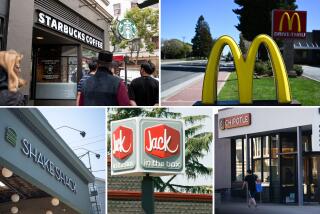Doughnut Maker Feels Rivals’ Bite : Chain Suffers Many Management Changes, Encroachment by Independents
When the urge for a doughnut would strike, Ed Garza used to drive off to the nearest Winchell’s Donut House.
Now, with doughnuts being sold in nearly every mini-mall and corner convenience store, Garza, a Pasadena medical products salesman, says he can be more choosy. His current favorite: Big Mama’s, a shop in Highland Park where the doughnuts are “bigger and better” than Winchell’s, he says.
“I go to Winchell’s less because of all the other doughnut places,” Garza said.
Winchell’s Donut Houses have been shaken by the loss of customers such as Garza, who have taken their appetites for jelly doughnuts and bear claws elsewhere. The once robust Winchell’s chain--its yellow-and-brown signs a common Southern California sight--has been beset by management mistakes and hordes of new rivals, analysts say.
Winchell’s, the nation’s second-largest chain behind Dunkin Donuts, has lost money two years in a row, and store sales have kept falling despite recent attempts to turn the 650-shop chain around. Last year, Winchell’s lost $12.8 million on sales of $145 million.
Three weeks ago, La Mirada-based Winchell’s officials, who declined to be interviewed for this story, said they were considering selling the chain. Winchell’s is 42% owned by the Denny’s coffee shop chain, which in turn is owned by New York-based TW Services. TW has agreed to be acquired by an investment group.
“The name has been allowed to deteriorate,” said Ward Lindenmayer, a San Francisco-based retail analyst who used to follow Winchell’s. “They have been allowed to get sloppy and dirty. There isn’t a whole lot of things going for it.”
Competing doughnut operators have watched the decline of Winchell’s and the numerous changes in top management--four presidents in the past five years--and ownership.
“They keep changing hands and that’s hard on the person who’s making a living in the store,” said Joe Apodaca, who has operated Georgia’s doughnuts in South Central Los Angeles for nearly 30 years.
Until recently, many Winchell stores had gone years without remodeling and were often staffed by a single person for most of the day and at night. Low-paid managers had little incentive to provide the high level of customer service many in the industry say is necessary to compete effectively.
“I think they have been hurt very badly over the years,” said one doughnut chain operator. “They don’t have the fine reputation today that they used to have.”
The chain is the namesake of Verne H. Winchell, who opened the first shop in Temple City in 1948, after trying his hand at selling used cars and jukeboxes.
After a rocky start, the chain blossomed. In 1968, Denny’s purchased the then 200-store operation in return for stock, and Winchell became chairman of the coffee shop chain until 1980.
When Denny’s was converted into a privately owned firm in 1984, Winchell received about $51 million for his shares--the fruit of the $27,000 he invested in the first Winchell’s store four decades earlier. Winchell could not be reached for comment for this story.
Under Denny’s, Winchell’s grew rapidly. The number of stores reached nearly 1,000 by the late 1970s, and Winchell’s soon opened in Japan and South Korea.
Winchell’s also took another fateful step under Denny’s--in 1971, it bought out its franchisees and converted all outlets to company-owned stores.
“It was a huge mistake,” said Lindenmayer. “You couldn’t pay enough to motivate the store employees. It’s not a prestigious job and it’s monotonous. The only incentive you have is if you own it.”
In contrast, Boston-based Dunkin Donuts, with more than 1,786 stores nationwide, is almost entirely operated by franchisees. The chain, which is fighting a takeover launched by two Canadian firms, has seen sales and profits grow steadily during the past five years.
Besides unmotivated store managers, Winchell’s also suffered from disinterested executives at Denny’s after Verne Winchell departed, Lindenmayer says. The executives saw little need to put money into a sluggish doughnut chain.
Meanwhile, Winchell’s faced growing numbers of competitors, including in-house bakeries at supermarkets, convenience stores and the countless numbers of mom-and-pop shops that seem to inhabit every Los Angeles mini-mall.
“All of a sudden you got hundreds if not thousands of outlets selling doughnuts,” Lindenmayer. “It’s convenient to buy doughnuts at Safeway if you are there already.”
Winchell’s has fought back with the introduction of creme-filled croissants and in-store ovens to bake muffins. The chain has closed about 200 poorly performing stores and once again began selling franchises in 1985.
The company has even joined forces with competitors. Winchell’s doughnuts are sold at more than 600 7-Eleven convenience stores in Southern and Central California. “We are delighted with the program,” said Don Cowan, a spokesman for the 7-Eleven chain. “It has added incremental sales to our stores.”
But store sales at Winchell’s continue to slide. Average store sales have sunk to $207,000 in 1988 from $217,000 in 1984.
The company also faces numerous lawsuits related to its conversion to a publicly traded limited partnership in December, 1986. Investors paid $18 a share for Winchell’s only to see the price fall below $4.
Despite its many problems, Winchell’s large network of stores in California has drawn interest. Dunkin Donuts, which has only a handful of stores in California, says it might be interested in parts of the chain but is not saying whether it is looking to put forward a bid.
Arthur S. Pfefferman, chairman of Woodland Hills-based Donut Inn, a 32-store chain, said he is putting together a bid for Winchell’s. “The network of stores is attractive,” Pfefferman said. “But they have many locations that we would not approve.”
Pfefferman is also counting on a loyal corps of Winchell’s customers who have grown up with Winchell’s.
“Winchell’s is an institution,” said Octavio Lopez, 36, after his daily morning stop at one of the chain’s shops in Glendale. “When somebody asks ‘Where do you want to go have a doughnut?,’ hell, I go to Winchell’s.”






